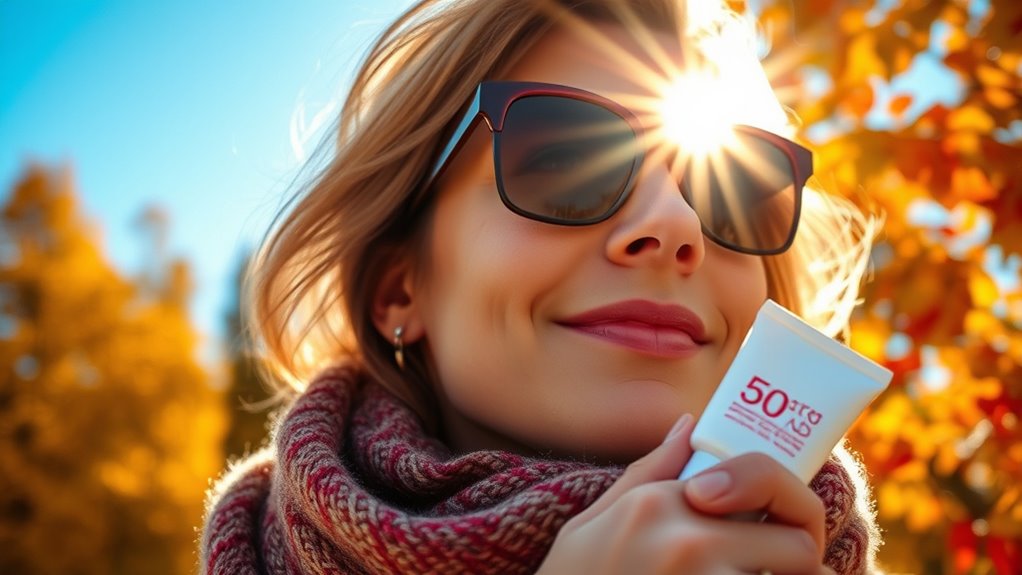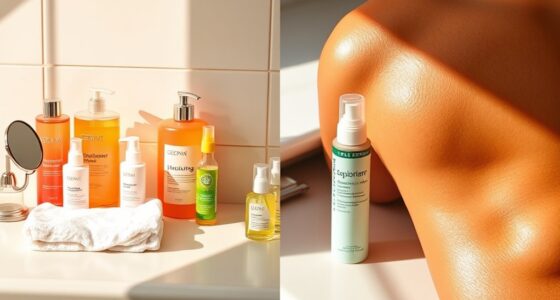Even in fall and winter, you need to wear sunscreen daily because UV rays can still harm your skin through clouds, snow, and reflective surfaces. Reapply every two hours when outdoors, especially in snowy conditions, and protect exposed areas like your face, lips, ears, and neck with SPF products. Wearing protective clothing and accessories can boost your defense. Keep these tips in mind to maintain healthy skin year-round—they’ll help you stay protected in any season.
Key Takeaways
- Apply broad-spectrum SPF 30+ sunscreen daily, even on cloudy or overcast fall and winter days.
- Reapply sunscreen every two hours outdoors, especially when snow reflects UV rays.
- Use protective clothing like hats, scarves, and UV-protective textiles to shield exposed skin.
- Incorporate hydrating sunscreens or SPF moisturizers to prevent skin dryness and irritation.
- Protect lips and sensitive areas with SPF lip balms and regularly reapply for comprehensive coverage.

No matter the season, safeguarding your skin from the sun’s harmful rays is crucial, but your sunscreen routine should adapt to changing conditions. During fall and winter, many people mistakenly believe they can skip or reduce their sun protection. However, UV rays remain a threat even when the sun isn’t shining brightly or temperatures drop. To maintain maximum UV protection, you need to adjust your skincare routines accordingly. UV rays can penetrate clouds and reflect off snow, making it easy to overlook their power. That’s why, regardless of the weather, wearing a broad-spectrum sunscreen daily is a smart move. Look for formulas that offer at least SPF 30, and ensure they protect against both UVA and UVB rays. Applying sunscreen should be your final step in your skincare routines every morning, right after cleansing and moisturizing. Don’t forget to reapply every two hours if you’re outdoors, especially if you’re active or exposed to snow or wind, which can increase the risk of skin damage.
In colder seasons, your skin might be drier and more sensitive, which can make you hesitant to layer on products. But skipping sunscreen can lead to premature aging, pigmentation, and increased skin cancer risk. To make it easier, choose sunscreens with hydrating ingredients like hyaluronic acid or glycerin, which can also support your skincare routines by maintaining moisture. If you’re wearing makeup, consider a tinted SPF or a moisturizer with built-in sun protection to streamline your routine. Remember, your face isn’t the only part that needs protection—don’t forget your neck, ears, and even your lips, which often get overlooked but are equally vulnerable to UV damage. Using a lip balm with SPF adds an extra layer of defense, especially when you’re out in the winter wind or snow.
Finally, adapt your habits to seasonal conditions. When it’s overcast, UV rays still penetrate clouds, so sunscreen is necessary. When you’re near reflective surfaces like snow or ice, your exposure can be amplified, so reapply more frequently. Wearing protective clothing like hats, scarves, and sunglasses also complements your UV protection efforts, reducing the need to rely solely on sunscreen. Additionally, incorporating protective textile line accessories such as UV-protective clothing can offer an extra barrier against harmful rays. By staying mindful of how UV rays behave in fall and winter, and adjusting your skincare routines accordingly, you’ll keep your skin protected, healthy, and youthful year-round.
Frequently Asked Questions
Does Sunscreen Need Reapplication on Cloudy Fall and Winter Days?
Yes, you still need to reapply sunscreen on cloudy fall and winter days. Cloud cover can block some UV rays, but it doesn’t eliminate them entirely, so your sunscreen’s effectiveness can decrease over time. To stay protected, reapply every two hours, especially if you’re outdoors for extended periods. Even on overcast days, UV rays can penetrate clouds, so consistent reapplication keeps your skin safe.
Can I Skip Sunscreen During Shorter Winter Daylight Hours?
If you think shorter winter daylight hours mean you can skip sunscreen, think again. For example, Emily, with sensitive skin, noticed her skin darkening after a winter hike without UV protection. Even on cloudy days, UV rays can harm your skin, especially if it’s sensitive. While the sun’s weaker, UV exposure still occurs, so it’s smart to wear sunscreen daily to protect your skin year-round.
How Does Snow Reflect UV Rays and Affect Sunscreen Needs?
Snow reflection markedly amplifies UV rays, so your sunscreen needs increase even on cloudy days. Snow reflects up to 80% of UV rays, intensifying your exposure. This snow reflection boosts UV amplification, making it easier for harmful rays to reach your skin. To stay protected, apply broad-spectrum sunscreen generously, reapply regularly, and wear protective clothing and sunglasses when you’re outdoors in snowy environments.
Are Mineral Sunscreens Better for Winter Outdoor Activities?
Think of mineral sunscreens as your armored shield against winter’s harsh rays. They’re often better for outdoor activities because their mineral benefits include broad-spectrum protection and quick absorption. Plus, if your skin’s sensitive, mineral formulas sit gently on your skin without causing irritation, making them a smart choice. As the sun reflects off snow, mineral sunscreens help you stay protected, no matter how cold or bright it gets outside.
What SPF Level Is Recommended for Winter Outdoor Exposure?
For winter outdoor exposure, you should choose an SPF 30 or higher to guarantee adequate UV protection. Your SPF selection depends on your skin type and the intensity of UV rays, especially if you’ll be around reflective surfaces like snow. Even on cloudy days, UV rays penetrate, so applying broad-spectrum sunscreen with a suitable SPF helps prevent skin damage. Always reapply every two hours for maximum protection.
Conclusion
So, as you pack away your summer sunscreen, don’t forget that those chilly, cloudy days can still sneak UV rays past your defenses. Ironically, winter’s gray skies often lull you into a false sense of security, making you think SPF isn’t necessary. But UV rays don’t take a vacation, even when you do. Stay protected year-round—after all, radiant skin isn’t just a summer luxury; it’s a year-round commitment.









